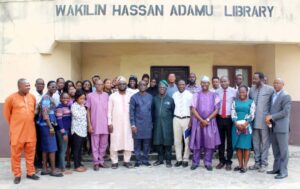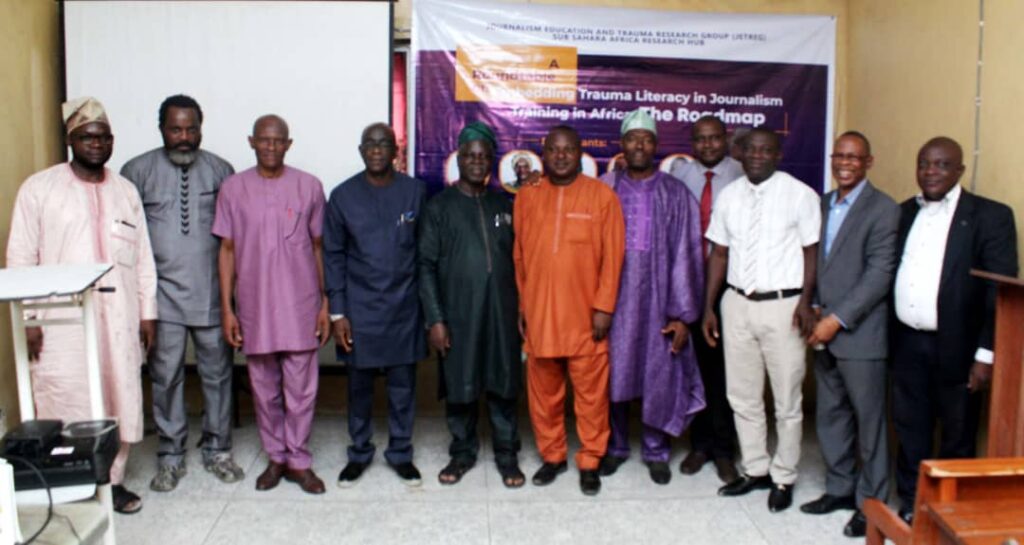The most avoided ignored belittled, denied, misunderstood and untreated cause of human suffering is perhaps trauma. They are wounds that never show on the body but are deeper and more hurtful than anything that bleeds.
To curb the effect of trauma in journalism practice, media experts have raised concerns about the risks of trauma faced by journalists in Nigeria; thereby requiring trauma awareness in journalism curricula so that they are better informed, sensitive and responsive.
This issue was discussed virtually and physically at the Nigerian Institute of Journalism (NIJ), Ogba, on May 5, 2022, in Lagos, under the umbrella of the Journalism Education and Trauma Research Group (JETREG); a Sub Sahara Africa Research Hub to respond to the body of research which shows that practising journalists are at risk for physical, emotional, moral and psychological injury due to exposure to traumatic events in the course of their career.
The training which was tagged: ‘A Roundtable on ‘Embedding Trauma Literacy in Journalism Training in Africa: The Roadmap’, had been put together to celebrate The World Press Freedom Day; with different media, and professionals speaking on the awareness of the potential effects of the trauma of journalists and the adaptive coping mechanisms.
The keynote speaker, Ola Ogunyemi; Lincoln University, UK, noted that journalists are daily exposed to traumatising events that could harm their mental health, hence the need to address the trauma risks.
According to him, only resilient journalists can cope with the occupational stress and trauma of the modern time, adding that, journalists must be equipped to learn how to deal with work stress, depression and fear.
Ogunyemi however, stressed the need for exposure to trauma reporting strategies and lessons in higher education and how it can foster “trauma-literate” journalists and editors, resulting in a healthier workforce and possibly a more humanized newsroom culture.
On the coping mechanism, the keynote speaker, therefore, advised that journalists, have good food and a balanced diet, take out time for relaxation and socialisation, as well as, ensure they maintain the balance between work and personal life.
Meanwhile, the Executive Secretary of the Nigerian Broadcasting Organization (BON) Dr Yemisi Bamgbose in his remarks, reiterated the need to develop a curriculum on journalist burnout and trauma.

According to him, research has shown that things are not so rosy in the business of news gathering and dissemination and as such, journalistic and media work has become very stressful. “The job is classified as high-stress work,” said Bamgbose.
The veteran however listed sources of burnout among journalists, which are: a toxic environment comprising low wages, non-payment of wages, work overload, property interference and discrimination, daily commutes on poor roads, insecurity, deadlines, lack of motivation and poor employee relations.
Bamgbose added that what journalists see in the line of duty, such as daily coverage of accidents, rituals, building collapses, could traumatize them.
“What journalists hear from their interaction with people who have escaped a traumatic experience can also affect them throughout life as well as their daily exposure to various negative offensive images, these could also be sources of trauma,” Bamgbose stated, noting that mistreatment and threats to life by police, military, thugs, and the community are also sources of trauma for journalists.
Speaking on the coping mechanism, Bamgbose urged the experts to instill in the curriculum resilience, preparation for psychological reactions and the dilemma that journalists might face at work.
Professor Bolanle Akeredolu-Ale, Former Deputy Vice-Chancellor, Federal University of Agriculture, Abeokuta, emphatically stated that trauma literacy should be involved in journalism education.
The communications professional and researcher, therefore, urged the NIJ to take the lead, adding that there should be a certificate program in trauma literacy in journalism.
Also speaking at the occasion, Mr Gbenga Adefaye; Provost, Nigerian Institute of Journalism (NIJ) and Chief Host of the JETREG Sub Sahara Africa Research Hub, noted that trauma literacy is an integral aspect of Journalism practice that has come to stay.
He said a lot of Journalists go through lots of trauma while covering assignment which affects the safety of the job and eventually leads to suicide cases.
According to him, it is essential for student journalists to know the nitty gritty of the profession they are entering into.
Having noted that the institute will begin to develop materials on trauma literacy for the young journalists, to prepare them ahead, the Provost urged that the young Journalists should be provided a safe space to talk about work related issues and be adequately motivated after going through so much stress.
“Beyond trauma literacy, is the poor salaries of Journalists and lack of motivation for journalists after going through so much stress and challenges,” Adefaye said.
Dr. Lai Oso; Professor of Mass Communication School of Communication, Lagos State University (LASU) in his remarks on the coping mechanism, urged journalists to speak up; speak to friends and family when going through stress and know that no story is worth their lives.
He said, “no story can be more than your life because, only the living can tell a story. Think about your safety and well-being”.
He urged employers to give their reporters time off and always learn to differentiate between their personal lives and work time.
A reporter who is trauma- literate understands the importance of both self-care and care for victims. This means the journalist is aware of the potential impact of traumatic story assignments and understands how to be an ethical and respectful news gatherer.
The panel discussion was co-organized by Dr. Dele Odunlami, Associate Professor, and Dr. Qasim Akinreti, Former Chairman, Lagos Council of the Nigeria Union of Journalists.


